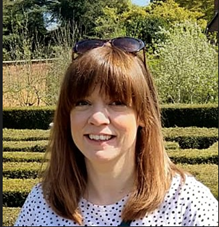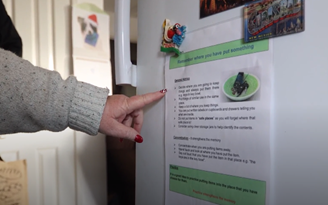Developing an entirely different way of offering occupational therapy to people with cognitive changes for the better
I came into post as Head Occupational Therapist for Older Adult Mental Health Services in Aneurin Bevan University Health Board just as COVID hit in March 2020. Despite the obvious distractions, I was very keen to capture a baseline of what the occupational therapy service was delivering and to identify the areas that were working well and where we had room for improvement in line with key drivers such as the Dementia Action plan for Wales (2018-2022).
Through the audit we found community older adult mental health occupational therapists were starting wo work with people with dementia quite a few years into a person’s ‘journey’ and when things were more often than not in a ‘crisis’.
The AHP Framework for Wales (2020) came out around this time, and it echoed a sentiment in my mind. We AHPs are generally getting to people too late and missing a crucial ‘spot’ in-terms of a more preventative approach to reducing untimely deconditioning.
Key dementia drivers in Wales reflected this need, where we had a gap in provision. The dementia standards (6 and 10) linked to the Dementia Action Plan for Walesset the target for services to offer a range of interventions within 12 weeks of diagnosis, ensuring support and advice is available in managing the effects of cognitive impairment on everyday living activities, roles and relationships. Supporting this vision, the Memory Services National Accreditation Programme (Royal College Of Psychiatry 2020) Standards 144, 148, 149, 151, recommend offering strategies and interventions to maximise living well with dementia and support maintaining roles and active engagement in community life.
Around this time during COVID, I started to purposefully use social media as a professional networking opportunity. I soon came across the amazing work being promoted by Scotland’s National AHP Consultant, Elaine Hunter. Home based memory rehabilitation and similar occupational therapy early interventions were being used well with great success and accolade, in a way that our population was missing out on. Our Dementia AHP lead for Wales, Natalie Elliott, supported us to make links with Elaine, who kindly gave some of her time to discuss the experiences in Scotland and give some pointers.
With references to key dementia drivers and great examples across the UK, I managed to secure some fixed term funding (in connection with the Dementia action plan for Wales) for two occupational therapy staff to undertake an early intervention occupational therapy pilot service.
With two very capable and enthusiastic occupational therapists in post (Matt Harris and Lisa Taylor), we were lucky to access a Home Based Memory Rehabilitation master class delivered by Occupational Therapist, Mary McGrath. Home Based Memory Rehabilitation (McGrath 2009) is a manualised but personalised occupational therapy programme (across 6 or more themed sessions) that supports people with memory changes to identify and embed ‘self-management’ strategies in daily routines to maximise independence.
With the first cohort of service users successfully undertaking the Home Based Memory Rehabilitation programme, we tapped into this willing group of individuals to undertake co-production work. We had two third year occupational therapy students support this too. The learning from the session was immeasurably helpful. We learnt what was definitely for keeping (what was working well) and what we could adapt/improve. For example, the group suggested some changes to the service information leaflet such as language used (avoiding jargon) and making sure the pictures were of a range of ages not just older people (we have lots of people with younger onset Dementia access the service too).
So, what about Home Based Memory Rehabilitation itself?
Well, it’s been one of the most exciting service developments I’ve had the privilege to be part of. Every step has been pure professional joy. This has been aided by capturing meaningful outcomes. We’ve used a standardised occupational therapy outcome measures (OCAIRS) which has worked wonderfully as a person-centred initial assessment and measure that you then repeat at the end of the programme to capture the outcomes. On average people improve in 8-10 of the OCAIRS 12 domains.
What about the number of daily living ‘self-management’ strategies people come away with?
I was hoping for maybe around 3 at best but on average, we see people embedding 6 self-management strategies into daily life by the end of the programme. That’s 6 ways a person is able to compensate for the impact of memory changes and 6 ways they aren’t reliant on others (where they were before). After 3 months, we follow up and have found people are sustaining on average 5 strategies. Some people go back to the memory strategy guide and embed more!
The positive impact to confidence at a time of huge worry, anxiety and loss of self is priceless. We capture this more ‘experiential’ outcomes through patient and carer feedback questionnaires offered to every participant and carer.
Consistently people give outstanding feedback about the impact on their confidence and being more in control of their ‘condition’ and managing their own day to day life. Carers too feel they have learnt how to better support their loved one to be more independent and not take over.
What has been the key to the service success?
The right person (occupational therapist with specialist dementia ‘rehabilitation’ skills) doing the right thing at the right time is central to why this service pilot has been such a success. This is also aided by the fact we give people the resources needed for the memory strategies such as orientation clocks, white boards and calendars. For transferable learning: capturing the right voices (co-production), meaningful outcomes and feedback cannot be underestimated. Its an absolute gift to service development and improvement.
What next?
The service has been such as success, we quickly found we were inundated with people wanting to access the service, but this is leading to an increased waiting time. We are currently using co-production again to explore some potential changes alongside using quality improvement methodology aiming to increase timely access to the service and exploring options for spread and scale models.
We are also grabbing opportunities for promotion to spread the word. We have had some opportunities for making some short videos about the service so watch this space!
Contributor
Jessica Moss, ABUHB Head Occupational Therapist, Older Adult Mental Health
X handle: @Jessica05338329

References
McGrath M and Passmore P (2009) Home-based memory rehabilitation programme for persons with mild dementia. Irish Journal of Medical Science 178 (Suppl 8).
Forsyth K., Deshpande S., Kielhofner G., et al. The Occupational Circumstances Assessment Interview and Rating Scale (OCAIRS) Chicago, Ill, USA: University of Illinois at Chicago; 2005. [Google Scholar]
Welsh Government (2020) Allied Health Professions Framework for Wales: Looking Forward Together. Available at: https://gov.wales/sites/default/files/publications/2020-02/allied-health-professions-framwework-for-wales.pdf.
Welsh Government (2022) Allied Health Professionals Dementia Framework for Wales: Maximising the impact of Allied Health Professionals in Wales working with people living with dementia 2022-2025. Available at: https://gov.wales/allied-health-professionalsdementia-framework-wales.
Welsh Government (2018) Dementia Action Plan for Wales 2018-2022. Available at: https://gov.wales/sites/default/files/publications/2019-04/dementia-action-plan-for-wales.pdf
Welsh Government (2021) All Wales Dementia Pathway and Standards for Wales: Available at:https://phw.nhs.wales/services-and-teams/improvement-cymru/news-and-blog/publications/dementia-standards/
Royal College of Psychiatry (2020) Memory Services National Accreditation Programme. Available at: msnap-standards-6th-edition-2018.pdf (rcpsych.ac.uk)

